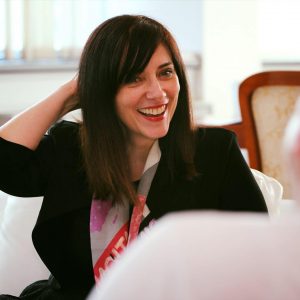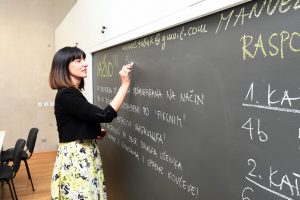The aim of the reform we are implementing is to align education with the needs of the labour market and to establish a better link between businesses and educational system which is the basis for competitiveness in the era of industry 4.0.
I am confident that we can create an environment for change by ourselves – says Blaženka Divljak, the Republic of Croatia’s Minister of Education, who is in charge of some of the biggest changes in the country’s educational system.

-
What are the key goals of curricular reform and how much does the reform respond to the challenges of the country’s competitiveness in education?
In short, the ultimate goal is – school for life. Student bags won’t be so heavy anymore, they will learn how to think critically and solve problems, and will not focus only on learning facts. We need to prepare for the digital age as we live in the era of the 4th Industrial Revolution. For teachers, the reform means less paperwork, but also new methods of teaching and evaluating students’ work. Through comprehensive curricular and structural changes, children and young people are provided with more useful and meaningful education that will enable them to live the modern life, and prepare them for work and the continuation of education. Teachers, education associates and other educational institutions will play a greater roles and bolster their professionalism, while having a greater autonomy, be engaged in more creative work and have fewer administrative obligations. The aim of the reform we are implementing is to align education with the needs of the labour market and to establish a better link between businesses and educational system which is the basis for competitiveness.
-
Will everything be ready on time for the experimental phase of “School of Life”?
The implementation of the activities is planned and organized so that everything is ready on time. The competent agencies and domicile and international experts are also involved, in addition to our Ministry. Teacher training began late last year, and I and my team have been visiting schools, getting a lot of positive feedback. Everyone is exciting about “School for Life” starting in autumn. In addition to the support from the European Commission, the state funding and first 150 million kuna from EU funds, for the first time ever, the Ministry of Science and Education has allocated over 200 million kuna for Curricular Reform, which finally sends a clear messageabout the readiness to implement this much-needed social change. Furthermore, as a part of “School for Life”, an experimental program received additional funds for school equipment and we also have experimental textbooks coming. Eleven publishers will launch 150 sets of experimental textbooks for the first and the fifth grade of elementary school, as well as books for STEM subjects in the seventh grade of elementary school and the first grade of high school.
-
How ready are the institutions ready for this initiative and how prepared are schools, in terms of their staff, to put this experiment into action? How willing are children and their parents to facilitate this new approach to education?
We work together with all the agencies in our education system and we are pleased to see just how motivated are all stakeholders to participate in this change. Studies have shown that over 80 percent of parents support the introduction of compulsory computing classes in the 5th and 6th grade of elementary school. Also, more than 70 percent of parents support curricular reform. We receive supportive e-mails from teachers and parents every day. The motivation is really at a high level. Over 3,700 teachers are involved in training and this is the biggest teacher training programme in the history of Croatia.

-
How compliant are your activities and ideas wiht the European Commission’s report on the implementation of structural reforms in Croatia, which includes reform of education, higher learning and science?
Naturally, our activities are guided by the European Commission’s report and recommendations. The report also mentions the projects that the Ministry of Science and Education has launched since my term in the office, and there is still much to be done in education reform, higher learning and science. Having such report is good because we can constantly refer to it. The report also states that certain encouraging steps have been made, and it contains a number of recommendations. We already implemented some of them in the first three months of this year. Also in the report, the European Commission assessed that it was a good thing to initiate the curricular reform, which results were already visible last year. Those who are interested in the Commission’s opinions can read the page 53 of the report where the Commission acknowledges the achieved results, and talks about the plans and experimental implementation of curricular reform. Of course, the report refers to what was done last year, but it also states that a part of the required documents has been prepared in accordance with a certain methodology and the accepted learning outcomes.
-
The quality education requires high GDP allocations. At this stage, are there any assumptions for the continued implementation of reforms in terms of the economic basis and the government’s approval of budgeting for these needs?
Our goal, to be achieved by 2020, if for science and research to have a 1.4 percent share in the national GDP, which currently stands at 1 percent, considering that the European average is around 2 percent, and the European target is 3 percent of the GDP. We are lagging behind, and personally, I will insist on and fight for the increase in funding for science and research for the next year.
-
In which way is the introduction of computer science in schools systematically organized? What is the ultimate goal here? Will the system produce a highly qualified workforce that is paid adequately high wages?
It is important for children to be more in touch with computing to be able to deal with the digital world, learn how to programme and think algorithmically. I want them to have interdisciplinary knowledge. I want computer classes not to serve the purpose of only getting grades, but for technology to be interdisciplinaryly incorporated into all school subjects. It is not our goal for students only to be able to recognize computer hardware or learn about floppies. The ultimate goal is not to just learn about facts, but to apply what they have learned and to have children equipped to deal with the digital age. At this point, we have 26 million kuna available for IT equipment and we will provide equipment for all the primary schools that we did not do last year, during the first phase of equipment provision. Therefore, everyone will have the same conditions for introduction of compulsory computing classes. Also, teacher training is ongoing.
-
Is there a danger of Croatia producing qualified workforce for predominantly foreign companies?
We need to ensure that young people are able to live quality life in Croatia. That’s what matters! We need to implement concrete activities that will create new jobs. We got over 373 million kuna from EU funds, which enabled 101 young scientists to stay in Croatia together with their families and build their career here. There is also “Career Development Project for Young Researchers – Training for New Doctors of Science”, which budget is 81 million kuna. During the project implementation over the next five years, funds will be allocated towards the employment of 154 young researchers and doctoral candidates in scientific organizations in the Republic of Croatia.
8.How much is the domestic economy ready to absorb new competencies and use it to raise its innovation capacity?
Given that we are in final negotiations regarding our membership in CERN, the world’s largest research lab, we were recently recently visited by the CERN’s five-member Expert Mission who assessed our capacity and conditions for potential membership. They were extremely pleased with what they saw and I am very proud of that. They were also impressed with how many innovative solutions, companies and individuals we have in Croatia. We also received a lot of good suggestions. I am confident that their report will be positive and that we will conclude this process by the end of this year, that is, we are going to sign a CERN accession agreement next year. This is a huge opportunity for us. Associated membership in CERN means the exchange of scientific knowledge and educational programmes, as well as 500 million euros annually for Croatian high-tech companies. In that respect, I am delighted and I am confident that we, our scientists, our innovators and our entrepreneurs will use this opportunity. I often underline that there is no given opportunity for change, bu that we create it ourselves.